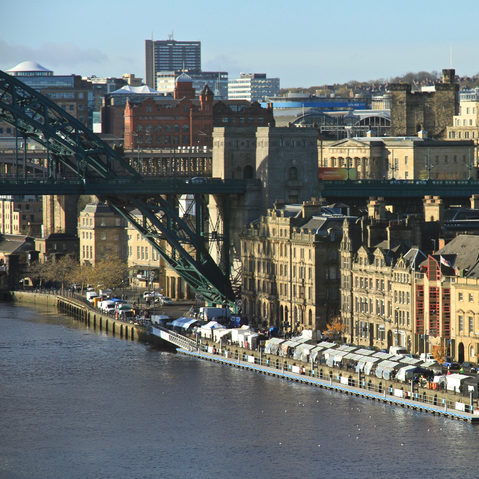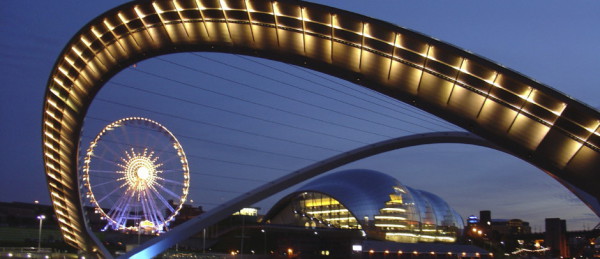Stories from the academy: Newcastle City Futures

Newcastle City Futures (NCF), led by Newcastle University, was formed in 2014 and grew out of Newcastle’s commitment to civic engagement, and our interest in the future of places. The idea of the civic university has been an intellectual force behind the Newcastle approach, but part of our mission is to demonstrate how deep engagement and collaboration can bring research advantage and funding opportunities for higher education, while generating citizen participation and business growth.
NCF started, unusually, not with research or academic expertise but rather with engagement: a pop up exhibition on Newcastle past, present and future at Newcastle’s Guildhall on the Quayside that attracted 2,400 visitors in June 2014 and led to a call to establish a place where people could create their own ideas for the future of Tyneside. In 2015, NCF went on to publish the Newcastle City Futures 2065 research report funded by the Chief Scientist’s Foresight Future of Cities project to look at long term trends and create an intelligence base of what’s happening in the city.
NCF is now one of five Urban Living Partnerships funded by the UK Research Councils and Innovate UK to encourage higher education to ‘give something back’ to the places where the universities are located, by brokering new collaborations, linking research to practice, and encouraging citizens and businesses to talk to each other. In our case, we cover both Newcastle and Gateshead.
The question most people ask then is, why on earth does the university get involved, what does the university get out of it? Essentially we are an ideas factory, generating unique partnerships to shape innovative solutions. We certainly create a platform for knowledge transfer, but the innovation space and collaboration opportunities also create unique blue chip research projects for academics; we use engagement and collaboration to create research, rather than the other way around.
Among the 30 projects developed over the last 12 months are: Metro Futures, creating a digital engagement platform to allow the public to design the new fleet of metro trains to achieve inclusive mobility; Future Homes, to create digitally enabled sustainable homes for an ageing society; the application of blue and green infrastructure and digital retailing in city centre shopping areas; the Big Draw, encouraging children to design their own future city; and a proposal to regenerate riverside walks and parks to encourage health and wellbeing.
Aspirations are raised by the brokerage, and the idea is always paramount, first and foremost, not a funding bid application. That means the innovation and partnership can endure, based around the idea even if funding is uncertain to deliver the project. But the continual generation of ideas borne from these collaborations also explains why bigger corporate players are now eager to be involved – NCF has moved from having 22 partners in June 2016 to over 70 now: it’s a growing story.
Digital and citizen engagement are cross cutting themes in every single project but we avoid saying we are a ‘smart city’; rather, we are smart and socially inclusive.
How does it work? Each project has to have representatives from public, private, voluntary and academic sectors involved. Each project links needs to business opportunities through a proof of concept approach, underpinned by the university’s R&D. And each project in its own way supports the delivery of public services in new and dynamic ways, while reinvigorating local democracy in more direct and transparent approaches. Every project has an academic champion who chairs the project consortium, but is also able to claim research intellectual property and impact storylines.
NCF has led to the establishment of a new governance process in Newcastle City Council with the formation of the “City Futures Development Group”, a special purpose local authority committee that brings researchers and policy makers together to discuss the long term needs of the City and endorses innovative projects.

And the past 12 months have been busy. Since May 2016, Newcastle City Futures has partnered 70 organisations, welcomed 35 businesses, facilitated 30 new innovative projects across the city, generated £1.5m to fund partner projects and submitted £15m in research bids, organised mashups with 150 people, had over 100 individual meetings, engaged 600 schoolchildren in digital ideas, received feedback from 3000 citizens, filmed 10 videos, won 3 prestigious research awards, changed the governance processes of 2 local authorities, showcased our work to 18 overseas countries and 13 UK Cities, participated in 20 high profile events, been cited in 3 government reports, and has featured in 20 media reports. More details of these activities and other planned activities in future can be found on our project website.
None of this is straightforward or easy. We have regular ‘bumps in the road’. Some of the ongoing challenges relate to: attitudes of both local authority and university ‘middle managers’ to our approach, understandably so; the failure of institutional leaders to communicate change and ambition with their organisations; suspicion of the university’s role; often disbelief that positive change can be achieved in places against a never ending ‘prophecy of doom’ media message about the north; the egos of academic ‘divas’; and being drawn in as a mediator within an organisation facing its own internal battles.
We have moved from an engagement platform, to a research and intelligence resource, to a policy influencer, and now we are a project facilitator. As our work goes forward, I am quite happy to describe NCF as a mechanism of convenience: the initiative is not the politicians’ or the university’s to own or control, it’s there for everyone in the city to use and to get involved with.
We live in challenging times, but we can still have ambition and create plans to make a difference to the place and its citizens. If all we do is raise ambitions, get people talking about the city they love, and demonstrate the potential of this great place, then we have achieved some modest outcomes after three years of work. But for a city like ‘The Toon’, I know that that’s just not going to be enough. We must engage, inspire and Innovate.
Professor Mark Tewdwr-Jones is Director of the Newcastle City Futures programme, Newcastle University, and Principal Investigator of the ESRC-funded Urban Living pilot in Newcastle and Gateshead Region. More information on the project can be found at www.newcastlecityfutures.org.